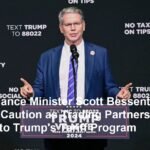Kuala Lumpur – In a bold statement amid rising global trade tensions, Malaysian Prime Minister Anwar Ibrahim has expressed confidence that the nation will remain insulated from a recession despite the impending imposition of a 24 percent reciprocal tariff by U.S. President Donald Trump. The tariffs, set to take effect on April 9, are seen as part of a broader maneuver in the escalating trade dispute between Washington and several key trading partners.
Addressing reporters at a press conference in Kuala Lumpur, PM Anwar Ibrahim reassured both domestic and international investors that Malaysia’s economic foundations are robust enough to withstand the shockwaves generated by these measures. “Our economy is built on resilience and flexibility,” the Prime Minister stated. “While any new tariff is a challenge for our export sectors, I am confident that this will not lead us into a recession. We have implemented policies aimed at diversifying our economy and strengthening our trade relationships worldwide.”
The 24 percent tariff is one of several retaliatory measures initiated by President Trump in response to what the United States deems as unfair trade practices. Although Malaysia has not been the central focus of the trade dispute, the tariff reflects a sweeping approach adopted by the Trump administration, targeting multiple economies perceived to be part of a protectionist trade environment. Malaysian officials, however, are quick to highlight that the nation has long maintained a forward-looking economic strategy that does not rely solely on any single market.
Economic analysts note that while the new tariff will likely increase the cost of Malaysian exports to the U.S., the nation’s diversified trading network may help cushion its economic impact. Malaysia’s robust trading relationships within the Association of Southeast Asian Nations (ASEAN), along with deep economic ties to the European Union and other Asian economies, provide a strong counterbalance. In recent years, Malaysia has emphasized the importance of expanding its export portfolio, boosting domestic manufacturing, and investing in innovation and technology-driven sectors.
Prime Minister Anwar Ibrahim acknowledged that the tariff could place temporary pressure on industries heavily reliant on American markets. However, he urged local businesses and industry leaders to view this as an opportunity to innovate and adapt. “The current situation should not be seen only as a challenge, but as a catalyst that pushes our industries to improve competitiveness and enhance value-added production,” he said. Anwar added that the government is prepared to work closely with the private sector to mitigate any adverse effects and explore new markets for Malaysian goods.
The government has outlined a series of measures aimed at smoothing the transition period following the tariff imposition. These plans include financial support packages for vulnerable sectors, increased investment in research and development, and enhanced trade facilitation efforts to expedite export processes. Officials emphasized that these strategies will not only help offset the tariff’s impact but also drive long-term economic growth.
International trade experts have responded positively to PM Anwar’s remarks. They note that Malaysia’s ability to resist a recession in the face of such policies depends largely on proactive government policies and strategic economic planning. “Malaysia has shown impressive economic agility in previous years, and the current policy framework focuses on long-term stability rather than short-term gains,” commented one leading Southeast Asian trade expert. He further explained that many countries have managed similar shocks by prioritizing economic diversification and strategic partnerships.
The tariff will officially be implemented on April 9, and its short-term effects will be closely monitored by both local authorities and international investors. As global trade dynamics continue to evolve, Malaysia’s leadership remains optimistic about turning potential challenges into opportunities for reinvention. With continued investments in infrastructure, technology, and innovation, the country is positioning itself to not only survive the current trade turbulence but to emerge even stronger.
In conclusion, while the imposition of a 24 percent tariff by the Trump administration represents a significant policy shift, Prime Minister Anwar Ibrahim’s confidence underscores Malaysia’s commitment to economic resilience. As the nation braces for these new challenges, the strategic measures already in place and the willingness of local industries to adapt provide a promising outlook for sustained growth and stability in the years ahead.












